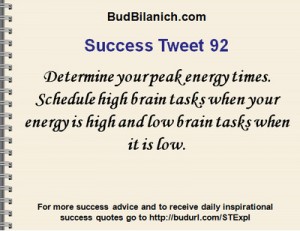 A long time ago I learned that my energy is high at the beginning of the day and at the end of the day. My energy is lowest mid day. I schedule myself accordingly.
A long time ago I learned that my energy is high at the beginning of the day and at the end of the day. My energy is lowest mid day. I schedule myself accordingly.
I reserve the morning for my important and urgent tasks – like writing and posting this blog. I use late afternoons and early evenings to work on my important but not urgent tasks – like writing my books and other thought pieces. Mid-day, I catch up on correspondence, return phone calls, exercise and run errands.
This works for me. I think best and most clearly in the morning and have a bit of a sinker mid-day. My energy and mental acuity picks up again late in the day. This is really helpful, as I get a lot done late in the day when many people are biding their time getting ready to go home.
This schedule works for me. It may or may not work for you. You have to determine your peak energy times and schedule yourself accordingly.
However, no matter how well you plan your day, surprises and interruptions will come along. A couple of years ago, I saw a great article on Success.com by David Allen called, “It’s Not About Time.” Mr. Allen suggests that too often we focus on managing our time when we should, in fact, be focused on managing ourselves.
“The savvy know that self management is really an issue of what we do with ourselves during the time we have. Self-management needs to encompass managing our thoughts and emotions, and dealing effectively with our work, family and community relationships. It’s about gaining dynamic balance of control and perspective to achieve more successful outcomes and feel more relaxed along the way.
Self-management is about knowing what to do at any given moment. It’s dealing effectively with the things we have to do to achieve our goals and fulfill our purpose. It’s also about deciding the importance of the varied and constant information coming at us.”
What do you think about David Allen’s ideas on self management? I like them. Even though I try to schedule my high brain tasks at the beginning and end of the day, I sometimes end up doing them mid-day when my energy is lowest. I have found that, no matter my preference, sometimes I have to deviate from my preferred schedule to handle matters that are out of my control.
As David Allen says, “self-management is about knowing what to do at any given moment.” This means that you cannot become a slave to your to-do list or your personal preferences. No matter how well you plan, you will be faced with new problems and opportunities every day. Sometimes, what I want to do is different from what I need to do. I bet you find this to be true too. My best career advice is to do what you need to, not what you want to, as you go through your day.
Do your best to schedule yourself so that you can deal with high brain tasks when your energy is highest. But when circumstances create different demands, suck it up and do the best you can every moment you have. The problems and opportunities on which you focus at any given moment in time will have a big impact on the level of your performance and, ultimately, your success. Don’t be so focused on managing your time that you miss opportunities because they fall outside of your plan for the day.
The common sense career success coach point here is simple. If you want to succeed in your life and career, you need to become an outstanding performer. To become an outstanding performer, you need to become a lifelong learner, set and achieve high goals and be well organized. Self management and time management are two important keys to becoming organized. They are tied to the career advice in Tweet 92 in Success Tweets. “Determine your peak energy times. Schedule high brain tasks when your energy is high and low brain tasks when it is low.” But don’t become a slave to your to do list or preferred manner of working. As David Allen points out, “Self management is different from time management because it allows you to respond at your best to surprises.”

Speak Your Mind